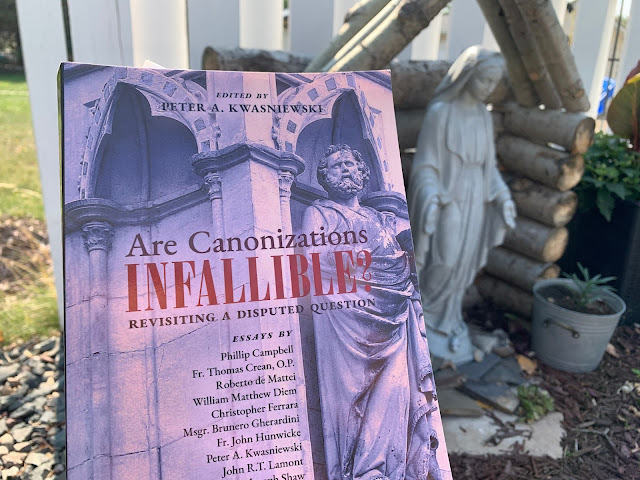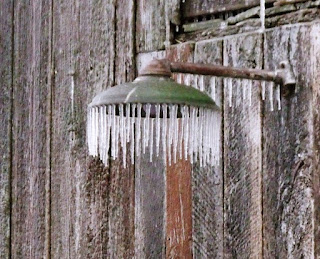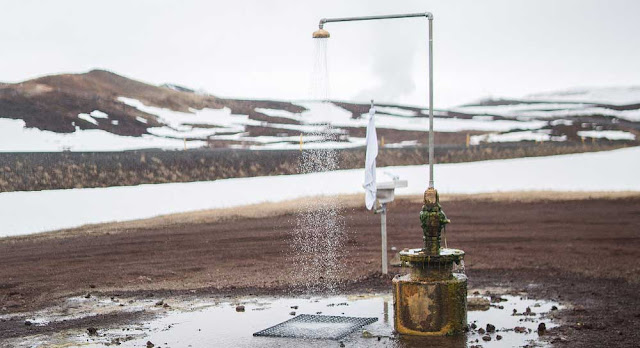To the Question: Are Canonizations Infallible? Finally, Help has Arrived
Are Canonizations Infallible? Revisiting a Disputed Question
Edited by Dr. Peter Kwasniewski
Arouca Press
274 Pages
Are canonizations infallible?
This is a loaded question. Your immediate answer will speak volumes about your life and experience as a Catholic.
Being raised in the 1990s, it was evident that the Church was a mess. Vocations were dropping faster than the pull of gravity, orthodoxy was scorned, catechism classes were a disaster - unless you liked crafts, and the Mass was traumatic - think girls dancing in the sanctuary to Days of Elijah while old people wiggled their butts in movement to the a spirit. Hip-replacements were a frequent reality at our parish (oh those hippies). But through it all, there was a sentiment amongst the few faithful Catholics that the pope was against all of this, and that these liberals were simply being disobedient. We were the real Catholics, and this mess wouldn't last forever.
And so, we believed certain things. We believed that the pope actually liked Latin, despite never raising a finger to bring it back. We believed that receiving Holy Communion on the tongue was still permitted, and not actually the normative (and necessary) practice for Catholics. We believed that when the Vatican spoke it was always true, and we sought to justify and defend statements that sounded strange (e.g. that JPII was the the pope "killed" by arrows in the 3rd secret of Fatima). Finally, we believed, among other things, that when a pope canonized a saint, it was infallible.
No one ever really explained why we believed these things. Such was the attitude of the 1990s. You took what you could get. Some were able to watch Mother Angelia Live for answers to Catholicism - if they had one of those large, illegal, satellite receivers. Others purchased books written by well-intentioned Catholics who really didn't know anything about the Church prior to 1965. Often you were simply left to reason things out on your own. When the Catechism came out it certainly helped, but by that time we realized that the liberals didn't actually care if something was in the Catechism of not.
So to the question: Are canonizations infallible? To a child mainly raised in the 1990s, the answer then would be an emphatic YES! Why? Um... because we were told, incorrectly, that in the ceremony the pope invoked his infallibility. And there were also some references to this saint named Aquinas. That was good enough for us. Move along.
My journey as a Catholic - I hate that term - has brought me to its roots. I no longer am satisfied with half-explanations for why things are the way they are. I want real answers. As it goes, I find these answers when analyzing Catholicism in the fullness of tradition. This brings many red-pill moments. So be it. The Truth - not half-truths - will set us free.
When Paul VI was canonized by Pope Francis back in 2018, I knew I needed real answers to this issue. How is it actually possible? The papacy of Paul VI - God bless him for Humanae Vitae - was a catastrophe. Read historian Henry Sires' work for further details. How can Paul VI infallibly be declared a saint? As one to be followed and imitated?
Enter the book: Are Canonizations Infallible?
Now this book has garnered much controversy. You may remember back in June when I took issue with some Catholics who were attacking a certain professor over a book they had never read. It seems the complainers were fearful that their Catholic worldview might come crashing down. The book in question was this one.
So what of the actual book? Is it good? Is it worth it?
I will sum it up with this: As I was nearly finished reading it my wife looked at me and asked, "So, is the book good?" My reply was simple, "It's blowing my mind... again."
The first few chapters get to actual foundations for a canonization... what it is, how it started, what are the procedures, what Aquinas actually said about it, how Vatican I comes into play, the changes of 1983 in the process... it's all there. And don't worry, there are arguments given for and against infallible canonizations (as I read, I found the against arguments to be more reasonable). The book is immensely informative. It is scholarly, yet completely approachable. I will surely use it in the future as a reference guide.
However, it wasn't until near the end of the book, when essays by Hunwicke, Ferrara, Kwasniewski, Shaw (etc.) started showing up, that my mind really began to be blown away. They hold back nothing. What is a miracle? What were Paul VI's "miracles"? Or Romero's? Does the process matter or not? Why have a process if not? What is heroic virtue? Is every canonization infallible? Just some? Is infallibility actually invoked (spoiler alert, the answer is no)? What if a credible and serious allegations rise against a recently canonized saint? And, most importantly, was does the Church actually say on the matter?
My oh my. Truth is a beautiful thing. But sometimes it blows your mind. This book did just that. I highly recommend it. It is a necessary service to Catholics.
So to the actual question, are canonizations infallible? I know my opinion has been altered greatly. How so?
You'll just have to get the book and see for yourself.







Thanks so much for this review. My concern: If we can pick apart a proclamation that does “define and declare,” if we are free to reject a papal definition if it doesn’t meet our standards, then what happens when Francis comes out with a similarly-worded ex cathedra statement? Catholic commenters and “influencers” will find a way to tell us that doesn’t count, either. I suppose I have to read the book, but it will have to convince me that Catholics can question papal definitions and declarations. It seems thoroughly un-Catholic to me - not because every word of a pope is infallible but because definitions officially proclaimed by a pope must be infallible. Otherwise we’re no different than the liberal cafeteria Catholics we used to decry. We pick and choose, we just pick and choose differently than they do.
ReplyDeleteThanks for your thoughtful comment, Sharon. The book does go into detail on the "define and declare" statement. I believe it is in Fr. Hunwicke's chapter. There are some points to note. 1) Pope Benedict, at least in examining his actions, did not believe that the canonization prayer was infallible (when he began as pope), and thus added further invocations to the Holy Spirit to aid the declaration. 2) Pope Francis, interestingly enough, took these prayers out. 3) The Church has never officially declared that canonizations are infallible. 4) I believe every writer in this books more or less stated they would gladly welcome and accept official clarification from the pope.
DeleteGod Bless
Some thoughts on this from a cradle Catholic older than Dr. K, lived through the changes, and joined the traditionalist movement in the mid 70s. Disclaimer: I haven’t read the book.
Delete1. Traditional Catholics never really questioned the infallibility of canonizations until some people started being canonized that certain traditionalists did not like. That is the first time such a thing came into vogue in recent years. St. Josemaría Escrivá is an example.
2. To question the infallibility of canonizations is to basically question the indefectibility of the Catholic Church for the following reasons.
When a baptized Catholic dies, there are three possible places for his/her soul to go immediately after the particular judgment: heaven, purgatory, or hell.
If the person enters either heaven or purgatory, he/she is, ipso facto, a saint. The word “saint” means "holy" (bien sur) and to say “the holy souls” in purgatory is the same as saying “the saints” in purgatory. And of course the people in heaven are “saints.”
Regardless of where any of the deceased saints are at the moment, they are all worthy of veneration. We venerate and pray to the holy souls in purgatory. Ditto for the souls in heaven. A difference is that we pray FOR the holy souls in purgatory but do not do so for the souls in heaven.
Catholics venerate every single saint though, even those we don’t know. That’s why there are feast days for All Saints (saints in heaven) and All Souls (saints in purgatory). Thus, every deceased baptized Catholic who is not damned has at least one feast day.
However, regarding the last choice in destinations, hell, the Church does not pray FOR the souls there, the Church does not pray TO the souls there, and the Church does not VENERATE the souls there.
If canonizations are not infallible, that makes it possible that a particular person being canonized is neither in heaven nor purgatory but is, rather, in hell. Without infallibility in this matter, the Church would have to be open to the possibility that it may publicly be venerating someone who is actually damned.
That means Christ, who is the Head of the Church (Colossians 1:18), is part of a body that possibly venerates damned souls.
How could that ever be possible?
Further, how is it possible to deny that that is the logical conclusion to be drawn from the thesis that canonizations are not infallible?
Even further, if that is true, and it would have to be, that means a Catholic could legitimately question ALL canonizations. If not a single one of them is infallible, then we would have to admit that the Church could be mistaken as to the fate of Pius X and he could theoretically be in hell, so could Saint Theresa of Lisieux, along with untold numbers of others we consider saints.
Bottom line: It is not possible for the Catholic Church to declare someone as being saved and worthy of veneration when that person is, in reality, in hell; and if that is not possible -- and it is not -- that means canonizations are infallible because the only other fates after death both signify sainthood, the only difference being the timing of admittance to the beatific vision.
A dead baptized Catholic who is not in hell must either be in heaven or purgatory, but in either scenario he/she is a “saint” who is worthy of veneration.
It is not possible for the Catholic Church to publicly venerate someone who is damned, and if that is not possible, then canonizations must be infallible.
DJR
The arguments for Canonizations of Saints by Popes make much more sense if you take the 1012 SedeVacantIst position. I don't endorse Richard Ibranyi, Williams Noris, or Thomas DeLaney but their post-2013 video lectures on their website johnthebaptist.us prove the apostasy goes back to the 11th and 12th centuries.
ReplyDelete